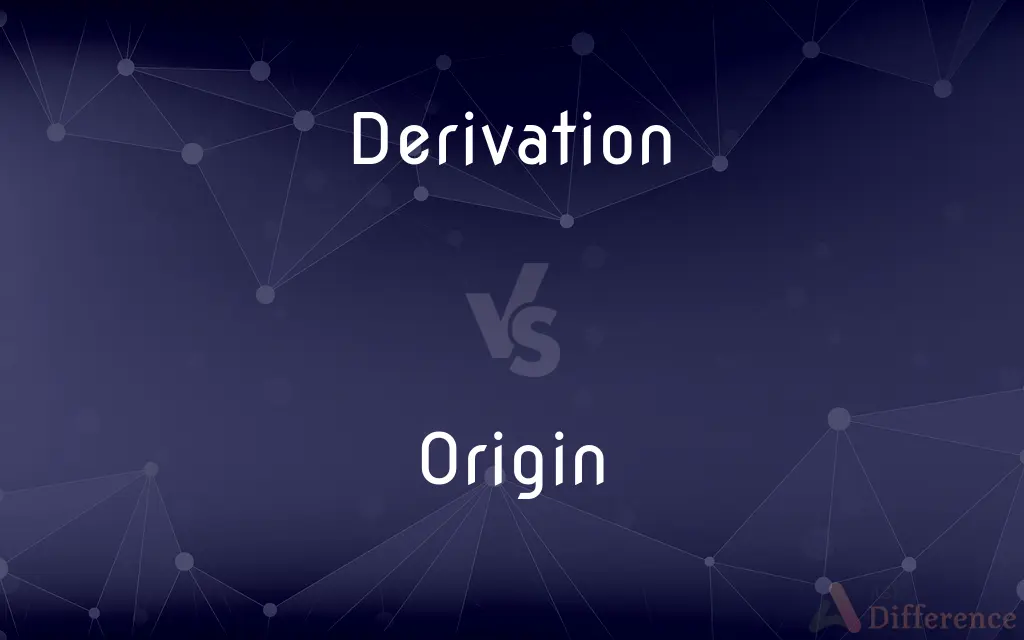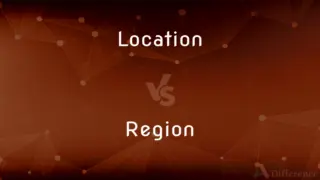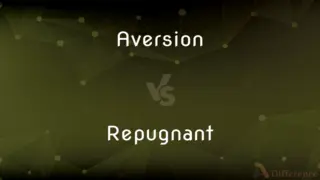Derivation vs. Origin — What's the Difference?

Difference Between Derivation and Origin
ADVERTISEMENT
Compare with Definitions
Derivation
The act or process of deriving.
Origin
The point at which something comes into existence or from which it derives or is derived.
Derivation
The state or fact of being derived; origination
A custom of recent derivation.
Origin
Often origins Ancestry
"We cannot escape our origins, however hard we try" (James Baldwin).
Derivation
Something derived; a derivative.
ADVERTISEMENT
Origin
The fact of originating; rise or derivation
The rumor had its origin in an impulsive remark.
Derivation
The form or source from which something is derived; an origin.
Origin
(Anatomy) The point of attachment of a muscle that remains relatively fixed during contraction.
Derivation
The historical origin and development of a word; an etymology.
Origin
(Mathematics) The point of intersection of coordinate axes, as in the Cartesian coordinate system.
Derivation
The process by which words are formed from existing words or bases by adding affixes, as singer from sing or undo from do, by changing the shape of the word or base, as song from sing, or by adding an affix and changing the pronunciation of the word or base, as electricity from electric.
Origin
The beginning of something.
Derivation
In generative linguistics, the generation of a linguistic structure through an ordered or partially ordered series of operations on other structures, such as the creation of a surface structure from a deep structure, or of a complex word from its morphological components.
Origin
The source of a river, information, goods, etc.
Derivation
The formal description of the process of such generation.
Origin
(mathematics) The point at which the axes of a coordinate system intersect.
Derivation
Logic & Mathematics A logical or mathematical process indicating through a sequence of statements that a result such as a theorem or a formula necessarily follows from the initial assumptions.
Origin
(anatomy) The proximal end of attachment of a muscle to a bone that will not be moved by the action of that muscle.
Derivation
A leading or drawing off of water from a stream or source.
Origin
(cartography) An arbitrary point on Earth's surface, chosen as the zero for a system of coordinates.
Derivation
The act of receiving anything from a source; the act of procuring an effect from a cause, means, or condition, as profits from capital, conclusions or opinions from evidence.
Origin
(in the plural) Ancestry.
Derivation
The act of tracing origin or descent.
The derivation of a word from an Indo-European root
Origin
The first existence or beginning of anything; the birth.
This mixed system of opinion and sentiment had its origin in the ancient chivalry.
Derivation
(grammar) Forming a new word by changing the base of another word or by adding affixes to it.
Origin
That from which anything primarily proceeds; the fountain; the spring; the cause; the occasion.
Derivation
The state or method of being derived; the relation of origin when established or asserted.
Origin
The point of attachment or end of a muscle which is fixed during contraction; - in contradistinction to insertion.
I think he would have set out just as he did, with the origin of ideas - the proper starting point of a grammarian, who is to treat of their signs.
Famous Greece,That source of art and cultivated thoughtWhich they to Rome, and Romans hither, brought.
Derivation
That from which a thing is derived.
Origin
The place where something begins, where it springs into being;
The Italian beginning of the Renaissance
Jupiter was the origin of the radiation
Pittsburgh is the source of the Ohio River
Communism's Russian root
Derivation
That which is derived; a derivative; a deduction.
Origin
Properties attributable to your ancestry;
He comes from good origins
Derivation
(mathematics) The operation of deducing one function from another according to a fixed definition, referred to as derivation or differentiation; this is the inverse operation to integration.
Origin
An event that is a beginning; a first part or stage of subsequent events
Derivation
(medicine) A drawing of humors or fluids from one part of the body to another, to relieve or lessen a morbid process.
Origin
The point of intersection of coordinate axes; where the values of the coordinates are all zero
Derivation
A leading or drawing off of water from a stream or source.
Origin
The descendants of one individual;
His entire lineage has been warriors
Derivation
The act of receiving anything from a source; the act of procuring an effect from a cause, means, or condition, as profits from capital, conclusions or opinions from evidence.
As touching traditional communication, . . . I do not doubt but many of those truths have had the help of that derivation.
Derivation
The act of tracing origin or descent, as in grammar or genealogy; as, the derivation of a word from an Aryan root.
Derivation
The state or method of being derived; the relation of origin when established or asserted.
Derivation
That from which a thing is derived.
Derivation
That which is derived; a derivative; a deduction.
From the Euphrates into an artificial derivation of that river.
Derivation
The operation of deducing one function from another according to some fixed law, called the law of derivation, as the operation of differentiation or of integration.
Derivation
A drawing of humors or fluids from one part of the body to another, to relieve or lessen a morbid process.
Derivation
The formation of a word from its more original or radical elements; also, a statement of the origin and history of a word.
Derivation
The source from which something derives (i.e. comes or issues);
He prefers shoes of Italian derivation
Derivation
(historical linguistics) an explanation of the historical origins of a word or phrase
Derivation
A line of reasoning that shows how a conclusion follows logically from accepted propositions
Derivation
(descriptive linguistics) the process whereby new words are formed from existing words or bases by affixation: `singer' from `sing'; `undo' from `do'
Derivation
Inherited properties shared with others of your bloodline
Derivation
Drawing of fluid or inflammation away from a diseased part of the body
Derivation
Drawing off water from its main channel as for irrigation
Share Your Discovery

Previous Comparison
Location vs. Region
Next Comparison
Aversion vs. Repugnant













































